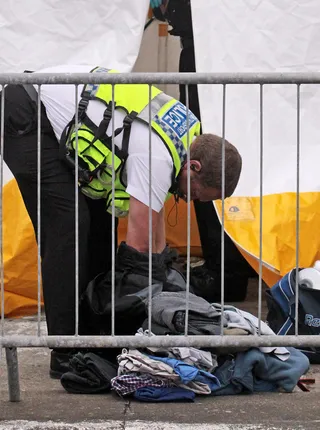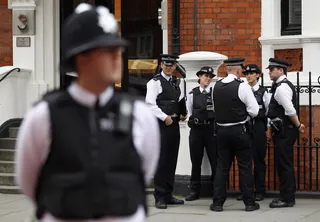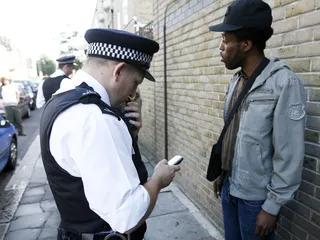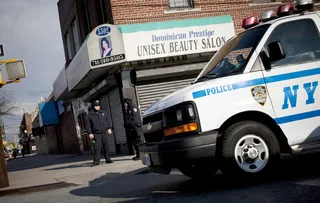Stop and Frisk vs. Stop and Search
Compare the controversial police tactics in U.S. and U.K.

1 / 12
Stop and Frisk vs. Stop and Search - In the U.S. and the U.K., minorities have long railed against random police stops, with claims that the practice lends itself to racial profiling. Now, as Britain makes an effort to reform its system by conducting a survey on routine police stops, BET.com compares two of the most controversial police tactics of our time: New York City’s stop-and-frisk policy and the U.K.’s stop-and-search. — Naeesa Aziz (Photos from left: Spencer Platt/Getty Images, Matthew Lloyd/Getty Images)

2 / 12
New York’s Legal Backing - Under Section 140.50 of New York’s Criminal Procedure law, police can search anyone if an officer “reasonably suspects that such person is committing, has committed or is about to commit either (a) a felony or (b) a misdemeanor defined in the penal law, and may demand of him his name, address and an explanation of his conduct. (Photo: Allison Joyce/Getty Images)

3 / 12
London’s Legal Backing - Section 60 of the Criminal Justice and Public Order Act gives police the right to search anyone in a defined area at a specific time when they believe there is the possibility of serious violence; or that a person is carrying a dangerous object or offensive weapon; or that an incident involving serious violence has taken place and a dangerous instrument or offensive weapon used in the incident is being carried in the area. (Photo: Matt Cardy/Getty Images)
Photo By Photo: Matt Cardy/Getty Images

4 / 12
Rights in the U.S. - You do not have to speak to the police during a stop. You can tell police, “I would like to remain silent,” at any time during the stop. (Photo: REUTERS/Eduardo Munoz)

5 / 12
Your Rights in the U.K. - A police officer can stop you at any time and ask what you’re doing and why you’re in an area and/or where you’re going. (Photo: Oli Scarff/Getty Images)
Photo By Photo: Oli Scarff/Getty Images
ADVERTISEMENT

6 / 12
Police Rights in the U.S. - Police must have consent or a warrant to search a person, their belongings, car or house. (Photo: Justin Sullivan/Getty Images)

7 / 12
Police Rights in the U.K. - Police can stop and search you if they have “reasonable grounds” to suspect you have illegal drugs, a weapon, stolen property or something which could be used to commit a crime. (Photo: Oli Scarff/Getty Images)

8 / 12
ID in the U.S. - In New York, you are not required to carry ID, and you don’t have to show ID to a police officer. (Photo: Andrew Burton/Getty Images)

9 / 12
ID in the U.K. - You don't have to give your name and address if you are stopped and searched by the police. (Photo: REUTERS/Andrew Winning)
Photo By Photo: REUTERS/Andrew Winning

10 / 12
Search in the U.S. - Police cannot arrest you simply for refusing to consent to a search. (Photo: Allison Joyce/Getty Images)
Photo By Photo: Allison Joyce/Getty Images
ADVERTISEMENT

11 / 12
Search in the U.K. - You can be arrested if you refuse to be searched. During the search, a police officer can ask you to take off your coat, jacket, gloves or other clothing you may be wearing (such as a turban or veil). (Photo: Christopher Furlong/Getty Images)
